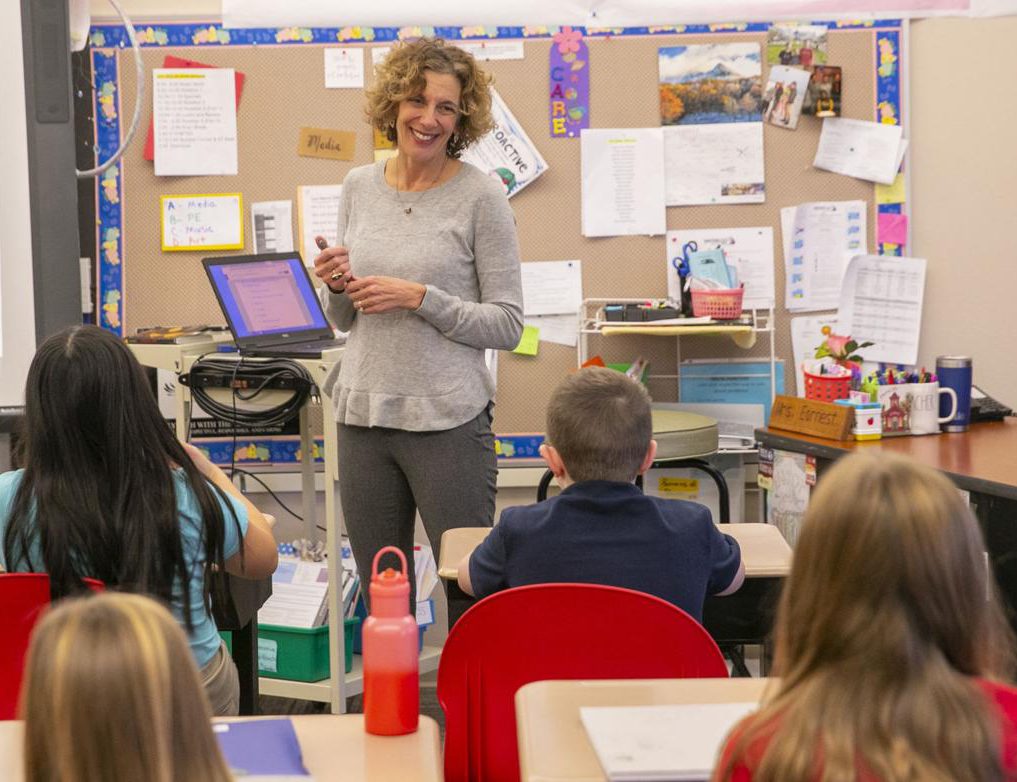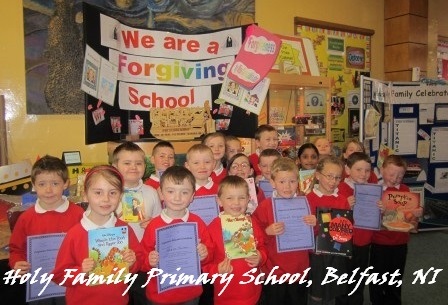Tagged: “Forgiveness Education”
Finding Hope in the Midst of Trauma
Editor’s Note: This blog post was written by Dr. Suzanne Freedman, Educational Psychology Professor at the University of Northern Iowa, and is reposted with the permission of both the author and of Darlene J. Harris, creator of the website “And He Restoreth My Soul Project” where the blog originally appeared on May 1, 2022.
I automatically connect hope to my work on the topic of interpersonal forgiveness as an approach to healing from a deep, personal and unfair hurt. In this blog post, I will discuss why I believe choosing to forgive can offer individuals who have experienced the trauma of child abuse or sexual assault hope of healing and the power to move beyond their abuse.

“Forgiveness offers a way to heal, and have hope for the future, while acknowledging what happened was wrong, unfair, and extremely hurtful,” according to Dr. Suzanne Freedman, shown here during a research project with 5th grade students.
It is normal and natural to feel angry, and hopeless as a result of childhood or sexual assault trauma and one has a right to these feelings for experiencing something no individual should have to go through. If one believes that healing is impossible and/or there is nothing that can change their current attitude, feelings, and thoughts toward their abuser, it is likely they will feel despair and quite hopeless. Forgiveness offers an option for healing that allows one to hope and have faith in a better future, while also acknowledging that the abuse they experienced was unfair, deeply hurtful and unacceptable.
“I am often asked ‘Why forgive?’ and my response is always the same, ‘What’s the alternative?’
Although forgiveness cannot undo the injury or damage caused by the injury, it allows us to move forward in our lives without the negative effects of all-consuming anger, hatred, and resentment.
It offers a way to heal and have hope for the future.”
Dr. Suzanne Freedman
Hope is believing that things will get better even if they don’t feel that way now. Hope is making the decision to forgive and committing to the process, even if one does not feel the forgiveness in their heart yet. Knowing that one is strong enough to move forward in their own healing, at their own pace increases feelings of hope for the future and leads to greater emotional and physical well-being.
Hope isn’t just nice to have, at times it is essential for survival in unbearable situations. Without hope, the will to live can diminish. One may stop caring about themselves and others, and their beliefs toward achieving a good life decrease. Hope, although scary, is directly related to a person’s belief that they can cope and move beyond the abuse or trauma they have endured.
Read the rest of Dr. Freedman’s full blog at “Finding Hope in the Midst of Trauma.”
Dr. Suzanne Freedman is a Professor in the Educational Psychology Department at the University of Northern Iowa in Cedar Falls, Iowa. Her dissertation on forgiveness with incest survivors at the University of Wisconsin-Madison was a landmark study that was published in the Journal of Consulting and Clinical Psychology. She will be a speaker at the July 19-20, 2022, International Educational Conference on Agape Love and Forgiveness in Madison, WI.
Darlene J. Harris is a sought-after speaker, author of And He Restoreth My Soul (an anthology and resource guide on sexual violence), and the developer/leader of workshops and retreats for women. She writes primarily on the topics of sexual abuse and molestation because by the age of 18 she had been raped twice. “I don’t want anyone to hurt like I did,” is the mantra that drives her. Read her true-life story in her own words.
Because forgiveness is so important, do you think it is obligatory that those, who learn to forgive and develop an enthusiasm for it, should now teach others about forgiveness?
Because forgiveness is a choice, I do not think that we should put pressure on those who forgive to now go and become teachers of others. I do think that it is reasonable to let those who forgive know that helping others to now forgive is good, if this resonates with the person. In my own experience, I see people, who develop a pattern of being persistent forgivers, often do have an internal self-chosen obligation to teach and help others.
Benefits of Classroom Forgiveness Education Confirmed by New Groundbreaking Study
.
Published this month in Child Development1 (Volume 93, Issue 2, March/April 2022), the critique analyzed 20 randomized intervention studies of forgiveness education programs that were  implemented during school years 1996 through 2021. These studies spanned demographically diverse geographic areas including North America, Europe, Asia, and the Middle East.
implemented during school years 1996 through 2021. These studies spanned demographically diverse geographic areas including North America, Europe, Asia, and the Middle East.
The research, “A meta‐analysis of forgiveness education interventions’ effects on forgiveness and anger in children and adolescents,” was conducted by University of Wisconsin-Madison researchers Hannah Rapp and Jiahe Wang Xu (both graduate students in the Dept. of Educational Psychology), and Dr. Robert Enright, educational psychology professor and co-founder of the International Forgiveness Institute (IFI).
Other significant observations and findings in the just-published report include:
- Children and adolescents inexplicably experience hurt and conflict in their interpersonal relationships and can “benefit from learning more about what forgiveness is and the process of how to forgive.”
- Forgiveness education interventions “are effective regardless of whether participants have experienced severe or mild offenses or attend schools in economically disadvantaged areas.”
- Programs of both short and long durations “can lead to significant positive change in anger and forgiveness outcomes.”
- Children who forgive are more accepted by their peers.
- Positive results for students “echoed findings from previous reviews of forgiveness interventions with primarily adult populations.”
- Forgiveness education interventions are “significantly effective” whether they are facilitated by schoolteachers or by researchers.
- The forgiveness education curriculum and process developed by Dr. Enright2 and the IFI “yielded significant effects.”
Overall, the analysis presents strong evidence that “children and adolescents can benefit from forgiveness education interventions.” Read the full meta-analysis report.
_______________________________________________________________________________________________________
1 Child Development is a 92-year-old bimonthly scientific journal published by the Society for Research in Child Development (SRCD). It is a vital source of information not only for researchers and theoreticians, but for a broad range of psychiatrists and psychologists, educators, and social workers in more than 60 countries around the world.
2 The Forgiveness Education curricula developed by Dr. Enright and the IFI for pre-k through 12th grade students is based on children’s story books. Those stories teach about forgiveness and other moral virtues and equip children with the knowledge of how to forgive a specific person who offends if they choose to do so. Lessons begin by educating participants about the five concepts that underlay forgiveness: inherent worth, kindness, respect, generosity, and agape love. During the program, participants read and discuss several age and culture-appropriate stories that display forgiveness between characters such as in The Tale of Despereaux by Kate DiCamillo and in Horton Hears a Who! by Dr. Seuss.
I have to admit that I am growing disgusted with social media. The anger that is expressed there is inhumane. What do you suggest as a way to start reducing this kind of expressed anger?
If more students have forgiveness education when they are young, then this will give them a chance to more deeply see the inherent (built-in) worth of others. As we see that all people are special, unique, and irreplaceable, I truly think that deliberately hurtful verbal attacks on others will lessen.
The Path to Peace Through Forgiveness
Dr. Robert Enright and the organization he founded, the International Forgiveness Institute (IFI), undertook their first foray into the peace movement in 1999. That was the year they worked with a national team led by the Rev. Jessie Jackson that convinced Yugoslav (now Serbia) President Slobodan Milošević to release three captive American soldiers during the Kosovo Conflict.
In 2002, Dr. Enright initiated a forgiveness education program in Belfast, Northern Ireland that has now been in operation for 20 consecutive years. His Belfast work is featured in the award-winning documentary The Power of Forgiveness. Dr. Enright started similar programs in Liberia, West Africa in 2011 and in Israel-Palestine in 2013. He now has such programs in more than 30 contentious regions around the world and an IFI Branch Office in Pakistan at the Government College University Lahore (GCU-Lahore, Pakistan).
Eight years ago, Dr. Enright was invited by the United Nations to join an international “Expert Group” tasked with responsibility for developing intervention models aimed at ending gender-based violence across the globe. His initial presentation to the United Nations Population Fund in New York City was titled “Forgiveness as a Peace Tool.” Just three weeks later, delegates at the United Nations Peace Conference in Geneva, Switzerland, voted to embrace forgiveness and education as essential tools in peacebuilding.
Since those early years of his career, Dr. Enright has developed scores of peace-education initiatives and research projects in some of the world’s most contentious areas. Two of those projects were published recently involving teachers in the case of China and adult clients in the case of Pakistan. Other research projects have demonstrated that children as young as 4-5 years are capable of absorbing the basics of forgiveness and making it a natural part of their early life.
In 2015, Dr. Enright accompanied Eva Mozes Kor, a survivor of the Holocaust, on a guest tour of US radio and television stations to promote peace through forgiveness. Ms. Kor, with her twin sister Miriam, was subjected to human experimentation under Josef Mengele at the Auschwitz concentration camp during World War II yet she publicly forgave her tormentors.
During that tour, Ms. Kor repeatedly used this axiom:
“Let’s work together to heal the world through forgiveness. Not bullets, not bombs. Just forgiveness. Anger is a seed for war. Forgiveness is a seed for peace.”
In a 2018 guest blog that Ms. Kor wrote for this website, “My Forgiveness,” she writes that forgiveness can “improve life for everyone in the world.” Read Dr. Enright’s eulogy to Ms. Kor (upon her death on July 4, 2019): “In Memoriam: Eva Mozes Kor and Her Independence Day.”
In recognition of his contributions to the peace movement, Dr. Enright was awarded the Distinguished Peace Educator of the Year Award (2008-2009), from the Wisconsin Institute for Peace and Conflict Studies. In 2012, he received the Cecil Findley Distinguished Service Award for international peacemaking and was named a Paul Harris Fellow by Rotary International in 2016. Three years later he was awarded the 2019 Mazzuchelli Medallion from Edgewood College along with a pronouncement that “forgiveness, relevant in every age, may be one of the clearest paths to peace, individually and collectively, for our world today.”
While Dr. Enright was one of the first forgiveness research investigators to envision a path to peace through forgiveness, he says there is still much more work that needs to be done.
“We must double our efforts so that peace and forgiveness become a team that is routinely tapped in matters of conflict,” Dr. Enright says. “The flames of resentment can be extinguished by sound forgiveness programs.”
Read Dr. Enright’s essay in Psychology Today, “Reflecting on 30 Years of Forgiveness Science.”



